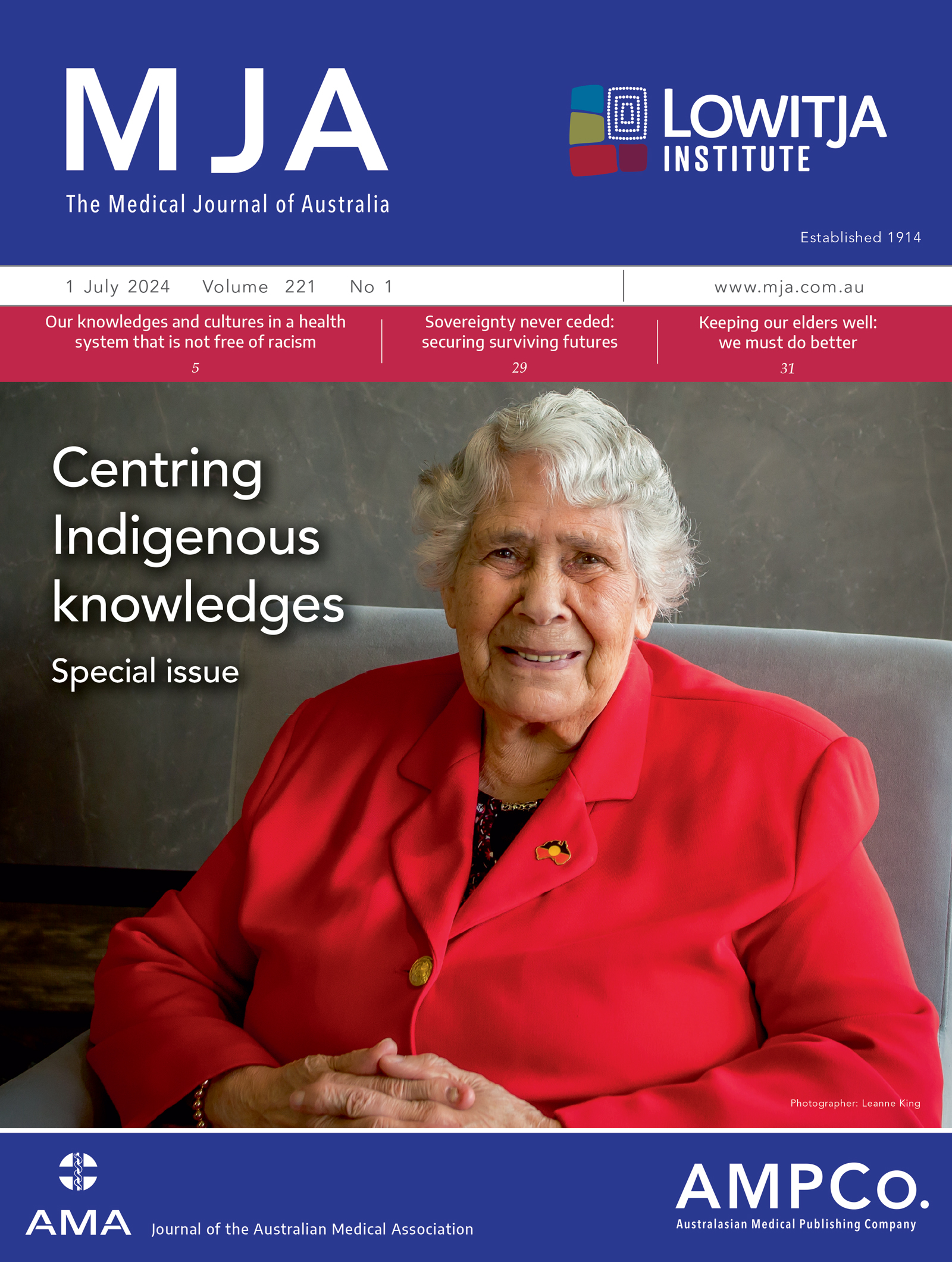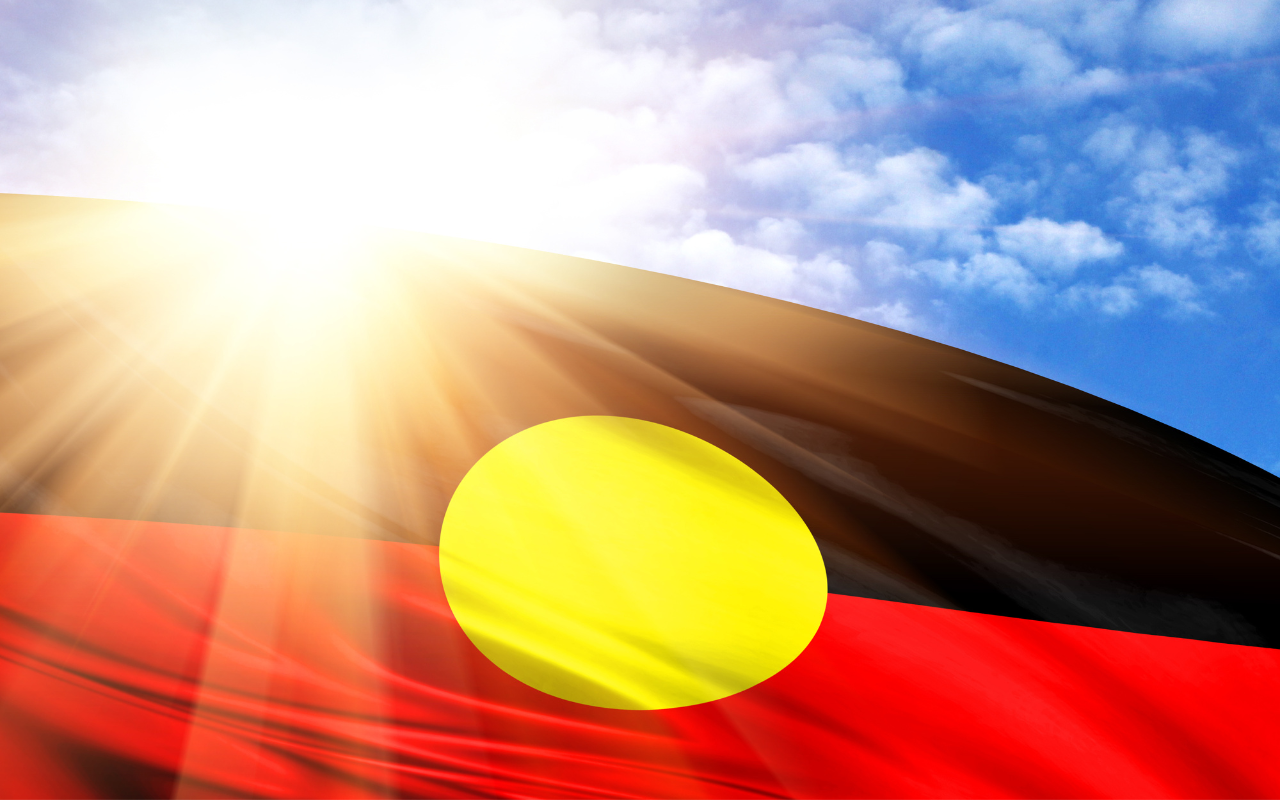The Medical Journal of Australia and the Lowitja Institute partner to address the exclusion of Aboriginal and Torres Strait Islanders from decision making in medical publishing.
In recognition of National NAIDOC Week, MJA has worked with a team of Aboriginal and Torres Strait Islander academics in a unique partnership that challenges power and privilege in scholarly publishing with the creation of a special issue in collaboration with the Lowitja Institute, Australia’s only national Aboriginal and Torres Strait Islander community controlled research institute.
The MJA’s Editor in Chief Virginia Barbour said the issue, which ceded editorial control to Indigenous guest editors, was a specific response to the outcome of the Voice referendum in 2023.
“Meaningful change will only come when those in power are prepared to step aside and let Aboriginal and Torres Strait Islander peoples lead their own affairs whilst supporting where required,” Professor Barbour said.
Indigenous health researchers have traditionally been marginalised or left out altogether in health, especially medical publishing.
“What was clear was that our previous ways of working, by applying Western norms of publishing, has led to exclusion of papers on Indigenous health and more crucially exclusion of Indigenous health researchers,” Prof Barbour said.

Professor Barbour said she was keen to work with the guest editors from the Lowitja Institute to reset this approach, not only for this issue, but how the MJA works moving forward.
“The main reason for the issue was my increasing awareness that the MJA as the national journal has the responsibility to publish research that best serves health care in Australia – for everyone.”
“There is a very long history – in Australia and elsewhere – of research being done on Indigenous people, by white people in ways that were culturally inappropriate. Part of the argument in the past has been that there are not enough Indigenous researchers,” Prof Barbour said.
“That is simply not true now – there is a growing community of highly knowledgeable Indigenous researchers – and we have to ensure that it must be the case going forward that research on Indigenous health must be Indigenous led and done with appropriate community engagement.”
Paul Stewart is CEO for Lowitja Institute and hails this as a pivotal time for Indigenous health research.
“This issue is the outcome of advocacy from our Indigenous leaders who have long called for greater acknowledgement of Aboriginal and Torres Strait Islander people’s contribution to research in advancing health outcomes for our mobs,” Mr Stewart said.
“Our late co-patron Dr Lowitja O’Donoghue AC CBE DSG often spoke of being courageous when it came to championing research led by our peoples, for our peoples. We thank MJA for providing this opportunity to showcase Blak excellence in health research.”
One of the NAIDOC issue’s guest editors, Associate Professor Michelle Kennedy of the Lowitja Institute, said it provided an opportunity to correct historical publishing practises that left Indigenous voices out.
“It is a practice that contradicts historical and contemporary publishing approaches in health and medical journals,” Assoc Prof Kennedy said.
The Guest Editors were able to give a broad insight into Indigenous health and the perspectives of Aboriginal and Torres Strait Islander academics.
“This issue has privileged Aboriginal and Torres Strait Islander ways of knowing, being and doing by providing a safe space for the articulation of these in a senior medical journal,” Assoc Prof Kennedy said.
“Our call for papers explicitly called for only the submission of research led by Aboriginal and Torres Strait Islander people, the articulation of ethical practices including community prioritisation and governance through the incorporation of the CONSIDER statement.”
Prof Barbour said editors are accustomed to being in positions of power, defining a journal’s priorities, and change should feel uncomfortable to be meaningful.
“If it were comfortable and easy, arguably we would already have ceded power. In order for it to be meaningful, we should understand that we should step beyond our usual ways of working,” Professor Barbour said.
“We had trust in the Guest Editors in that they understood how to approach publishing in a way that was best for their community. Our job was to facilitate what they wanted to do.”
Indigenous voices are important in creating better health outcomes for Aboriginal and Torres Strait Islander communities but haven’t been heard sufficiently in the past.
“Aboriginal and Torres Strait Islander voices and perspectives are central to advancing health systems and achieving equitable health outcomes. However, these voices have been silenced in spaces of power to transform and address colonial structures imposed on Aboriginal and Torres Strait Islander people,” Assoc Prof Kennedy said.
The Lowitja Institute team took great care in protecting the MJA’s publishing process.
“Our Guest Editorial team, consisting of Aboriginal and Torres Strait Islander researchers, clinicians and policy experts have safeguarded the publishing process” Assoc Prof Kennedy said.
“The opportunity to draw on collective wisdom and caretaking to create this special issue has been an honour and privilege,” Assoc Prof Kennedy said.
The MJA issue has begun the process of changing what happens so often in scientific or medical publishing, to be inclusive, rather than exclusive of Aboriginal and Torres Strait Islander people.
“Indigenous people’s knowledges and wisdom have been routinely excluded from practicing and leading in the biomedical health academy,” Guest Editor Professor Jacqueline Hughes said.
“The sciences that advance Indigenous peoples exclude Indigenous knowledges, which is a systematic bias…,”
“…MJA has undertaken a partnership with Lowitja Institute in which a Guest Editorial team, that has comprehensive capability, can support an editorial process that has not systematically excluded Indigenous Knowledges…,” Prof Hughes said.
Read the Special Issue of the MJA.
Subscribe to the free InSight+ weekly newsletter here. It is available to all readers, not just registered medical practitioners.

 more_vert
more_vert
Great to see the voice of the MJA purposefully shared like this.